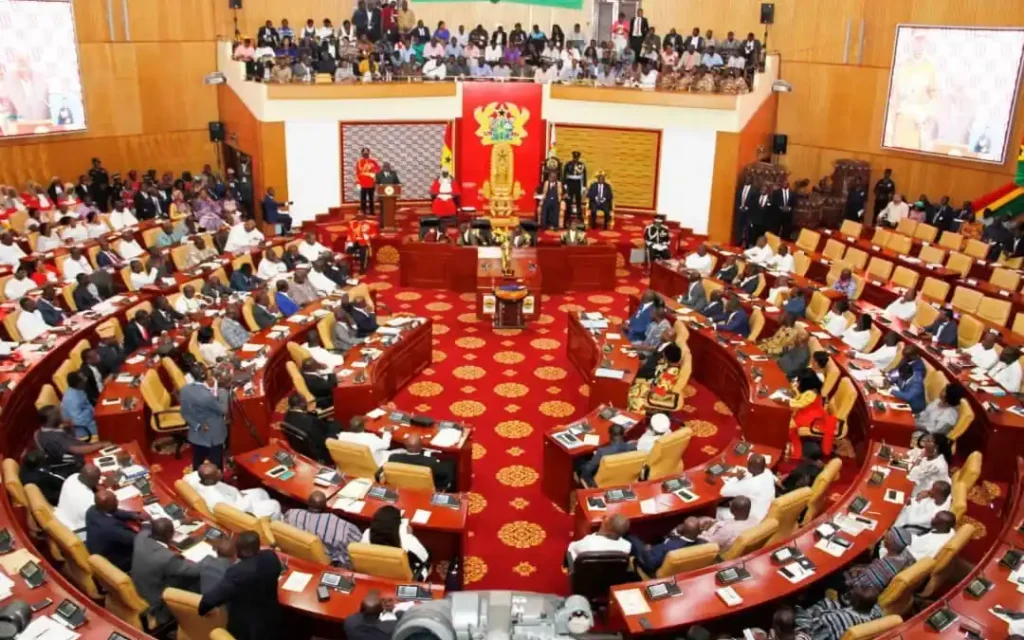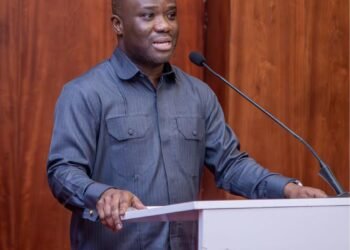In a recent development, the Supreme Court of Ghana ruled in favor of the New Patriotic Party (NPP) caucus, allowing it to retain its majority status in Parliament.
This ruling has stirred debates within the legislative body, as it reinforces the NPP’s position despite conflicting opinions from Parliament.
Amid this backdrop, Hon. Vincent Ekow Assafuah Esq. Member of Parliament for Old Tafo has expressed his perspective on the Supreme Court’s judgment and the process for reconvening Parliament.
He shed light on the procedures that allow for parliamentary sessions to be called in urgent situations, particularly in response to issues of national interest.
Reconvening Parliament: Two Constitutional Paths
However, he noted that the Standing Orders of Parliament, which are guided by the Constitution of the Republic of Ghana, outline two specific avenues for calling such a session.
“A trigger to reconvene Parliament comes in two ways; that is based on the standing orders of parliament that emanates from the constitution of the republic of Ghana article 110. But the Speaker of Parliament, without any application or petition whatsoever, can say that due to public interest, I am calling parliament based on these reasons. Secondly, a petition from Members of Parliament [amounting to] about 15% can also trigger [a reconvening] of Parliament.”
Hon. Vincent Ekow Assafuah Member of Parliament for Old Tafo
This insight highlights the structured framework in place for addressing urgent matters within the legislative body, whether initiated by the Speaker’s discretion or through a collective petition from MPs.
These constitutional paths ensure that pressing issues are addressed on time, reflecting the need for responsive governance.
The NPP’s Meeting and Potential Petition to Recall Parliament
As Hon. Assafuah indicated, the NPP caucus is considering the option of petitioning the Speaker of Parliament to call an emergency sitting.
“At this point in time, I think that the majority side is about to have a meeting. Then we will decide as to whether or not I think that it is going to be affirmative to trigger the Speaker of Parliament, or if you like, to petition the Speaker of Parliament to recall Parliament so that the urgent businesses that we are supposed to deal with can be dealt with.”
Hon. Vincent Ekow Assafuah Member of Parliament for Old Tafo
Hon. Assafuah’s remarks reflect the anticipation among the NPP members to discuss and deliberate on key issues now that the Supreme Court has ruled in favor of the NPP caucus in Parliament. Should the caucus agree to petition the Speaker, this would initiate an emergency sitting to address matters that are deemed essential in light of the recent court ruling and the resulting implications for governance.
Implications of the Supreme Court’s Judgment on Parliamentary Dynamics
Hon. Assafuah emphasized the significance of this ruling, noting that it brings clarity to the distribution of seats and puts an end to the ambiguity surrounding the majority-minority divide in Parliament.
“The judgment that comes today clearly indicates that the NPP is still the majority in Parliament. So I do not expect that anytime Parliament convenes, you will have the minority going to sit where the majority normally sits, because it is now clear, crystal clear. Some finality has been put to it that the NPP is still the majority in Parliament.”
Hon. Vincent Ekow Assafuah Member of Parliament for Old Tafo
Hon. Assafuah’s assertion underscores his view that the ruling settles ongoing debates over seating arrangements and party representation in Parliament.
The re-establishment of the NPP as the majority is expected to facilitate a smoother operational structure, allowing the majority to exercise its rights within the framework of parliamentary processes.
A Call to Address Urgent Business in Parliament

In light of the Supreme Court’s ruling, Hon. Assafuah highlighted the importance of reconvening Parliament to tackle pressing matters.
This perspective points to a proactive approach, whereby the NPP aims to address various issues affecting the nation, in alignment with its reaffirmed majority position.
Hon. Assafuah emphasized the need for parliament to reconvene while the NPPs resolved the issue to prioritize matters of national importance in an emergency sitting if it were to be called.
A New Chapter in Parliamentary Affairs
The Supreme Court’s recent decision brings finality to a contentious debate and reasserts the NPP’s majority status in Parliament.
Hon. Assafuah’s statements reflect the anticipation within the NPP caucus as they prepare to deliberate on key issues that impact governance.
His remarks also serve as a reminder of the procedural mechanisms that enable Parliament to address urgent matters swiftly, maintaining responsiveness in the face of national challenges.
As the NPP moves forward with its majority status, the upcoming sessions in Parliament are expected to reflect the renewed balance of power, contributing to a structured and effective legislative process.
READ ALSO; Beyoncé’s Cultural Impact To Be Taught at Yale University




















